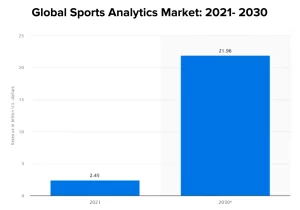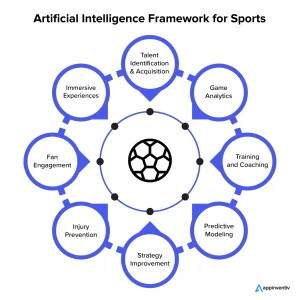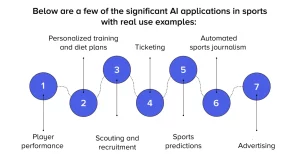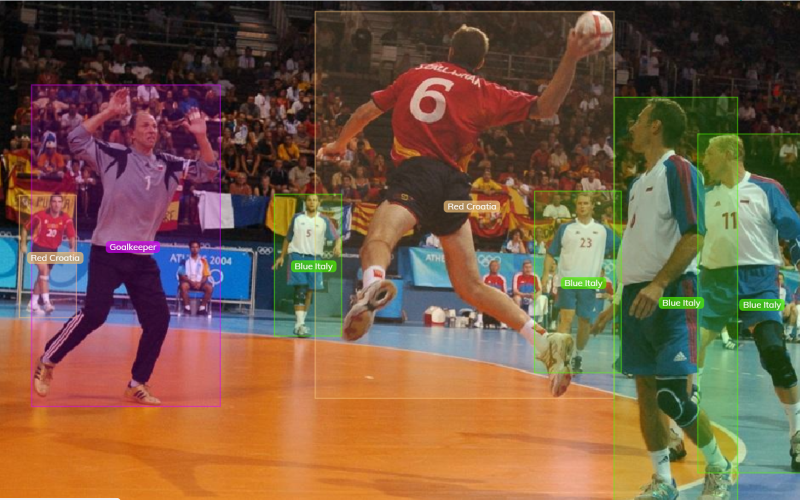As we move toward a technology-rich future, the world of sports is evolving by leaps and bounds. Statistical data has always played a central role in the sports, but one technology, in particular, is significantly increasing audience engagement and strategic gaming. This game-changing technology is artificial intelligence (AI), and its on the sports industry is profound.
The Evolution of Artificial Intelligence in Sports
Over the past two decades, AI has completely transformed how we engage with and analyze sports. AI and machine learning (ML) in sports are making the world smarter for athletes, broadcasters, advertisers, and viewers who can now access real-time statistics. One of the top benefits is the pivotal role AI plays in sports forecasting, facilitating informed decision-making processes.
Future of Artificial Intelligence in Sports
The applications of AI in the sports industry are already commonplace, even though not many experts talk about them at length. The positive impact and precision this technology brings make it clear that AI sports solutions will flourish in the future. This article explores the transformation AI is bringing to the sports industry, the uses and applications of artificial intelligence in sports, and what the future holds for AI technology in the sports business.
AI Statistics in Sports and Gaming
The market for artificial intelligence in the sports industry has seen significant growth in recent years. Advancements in AI technologies, increased investments from sports organizations, and a growing demand for data-driven insights are major factors driving this growth. For instance, the global sports analytics market is projected to reach a valuation of $22 billion by 2030.
Market Growth Projections

Similarly, the global AI sports market is forecasted to reach $19.9 billion by 2030. This indicates that the use of AI in the sports industry is expanding and will likely continue as more sports teams, leagues, and technology providers adopt AI sports analytics.
Factors influencing this market growth include the increased demand for player monitoring and tracking, real-time sports data analytics, AI for sports betting, and predictions. There is also a growing demand for virtual assistants and chatbots to interact with fans and sports enthusiasts.
Another study suggests that mobile applications such as HomeCourt, ESPN, and AI SmartCoach are used to assess players’ skills, providing them with valuable insights for improvement.
Introduction to Artificial Intelligence Framework for Sports

Artificial intelligence is an umbrella term covering a variety of “smart” technologies. It is revolutionizing numerous industries by analyzing data for insights, automating tasks, optimizing operations, and enhancing customer experiences.
AI Framework Components
An artificial intelligence framework for sports incorporates data collection and analysis to improve strategy and training. It utilizes real-time player tracking, performance statistics, and predictive modeling. This framework transforms the field of sports and performance improvement by leveraging AI algorithms for injury prevention, fan engagement, and immersive experiences.
The primary objective of AI in the sports industry is to enhance competitiveness both on and off the field. Let’s dive into the top AI uses in sports.
Talent Identification and Acquisition
Talent identification and acquisition involve various aspects such as biomechanics, player performance measurement, and player recruitment. Biomechanics plays a crucial role in assessing athletes’ physical capabilities and movement patterns, helping identify potential talent.
IoT in Performance Measurement
Using IoT in sports assists in player performance measurement, systematically evaluating players’ skills, abilities, and overall performance to gauge their suitability for recruitment.
Game Analytics in AI Sports Analytics
Game analytics encompasses components that contribute to the overall understanding and analysis of sports events.
Umpire Assistance
Umpire assistance involves using technology to aid umpires in making accurate decisions during matches. Ball tracking systems monitor the movement and trajectory of the ball in real-time, enhancing decision accuracy.
Match Events Analysis
Match events analysis examines various aspects of the game—such as goals, fouls, and substitutions—to gain insights into team performance and strategies. AI algorithms analyze vast amounts of data to make predictions and provide insights for sports betting.
Overall, game analytics is a comprehensive approach to understanding sports events, utilizing various technologies to gain valuable insights.
Training and Coaching
Training vs coaching in sports involve a wide range of responsibilities, including tactical planning, player injury modeling, and team formation assessment.
Tactical Planning
Tactical planning involves devising strategies and game plans to maximize the team’s chances of success.
Player Injury Modeling
Player injury modeling is crucial, helping identify potential risks and implement preventive measures.
Team Formation Assessment
Team formation assessment evaluates the strengths and weaknesses of players to create a cohesive and balanced team. These aspects contribute to a sports team’s overall development and success.
Predictive Modeling
Predictive modeling is another critical application of AI in sports analytics.
Outcome Predictions
AI models predict outcomes by considering biometrics, external factors, and historical data, forecasting player injuries, and assisting in developing injury prevention techniques. They also simulate game scenarios, aiding in strategic planning.
Strategy Improvement
AI now includes an opponent perspective, enabling teams to create more successful game plans by analyzing opponent data to identify patterns and tendencies. AI systems recommend optimal lineup combinations during games and make real-time tactical adjustments.
Injury Prevention
Real-time player biometric monitoring is a crucial component in AI-powered fitness and sports apps. This makes it possible to identify indicators of exhaustion, stress, or injury risks.
Prompt Interventions
Coaches and medical personnel are notified of these indicators, enabling timely interventions that ultimately lower the risk of injury.
Fan Engagement
AI-driven analytics are revolutionizing fan engagement by tailoring content, promotions, and interactions based on fan preferences and habits. This personalized strategy improves fan interactions, encouraging engagement and loyalty.
Immersive Experiences
AI enhances broadcasts through creative camera angles and augmented reality overlays, giving viewers a better experience. Virtual reality and gamified features create immersive and dynamic experiences for fans seeking deeper engagement.
AI Applications in Sports Business

AI applications in sports business are extensive. From player performance analysis to advertising, AI is revolutionizing the sports industry.
Player Performance
Predictive analytics and wearable technology help boost performance and health, enabling athletes to gather information on strain levels and avoid serious injuries. This also helps teams shape strong tactics and maximize their strength.
Scouting and Recruitment
Sports teams use AI to make competitions more intense by incorporating it into scouting and recruitment. Everything from player movements to body orientation is tracked to make informed decisions. Machine learning algorithms evaluate players’ skills and overall potential, improving recruitment decisions and building strong teams.
Ticketing
AI resolves common ticketing issues, such as crowd management at big sporting events. AI-based face recognition technology allows fans to enter stadiums without checking tickets, preventing bottlenecks and making entry more efficient.
Predictive and Cognitive Analytics
Predictive and cognitive analytics forecast attendance at stadiums, helping officials manage demand and ensure timely merchandise and food arrangements.
Sports Predictions
AI uses large data sets to forecast outcomes. While AI cannot guarantee exact results, its algorithms significantly improve upon human predictions.
Probabilistic Insights
AI tools analyze various factors—such as team formations, goals scored, key passes, and teammate interactions—to predict the closest match outcome scores.
Automated Sports Journalism
AI has simplified sports journalism by automating the process of converting score data into narratives using natural language processing (NLP). This enables the coverage of local matches without the need for on-field officials.
Advertising
AI identifies opportunities to present relevant ads based on demographics and game highlights. Brands benefit from better advertising by leveraging AI and machine learning algorithms that monitor players’ actions and audience emotions during matches.
The Future of AI in Sports
Artificial intelligence in the sports industry has redefined the concept of watching and playing games. With its broad scope of implementations, AI is set to reshape the sports business on multiple fronts.
Increased Competitiveness
AI sensors and algorithms enhance game strategies, benefiting sports companies, advertisers, franchise owners, and spectators.
Investment in AI Development Services
Businesses are likely to invest in AI development services for sports application development, driving innovation and redefining industry standards.
How Appinventiv Can Help
Appinventiv is a leading AI services company crafting innovative AI solutions for the sports industry. Our expert team simplifies the sports app development process, from ideation to execution. Whether it’s implementing interactive features, providing real-time updates, or ensuring a seamless user experience, we have got you covered.
Elevate your business with premium AI-driven solutions and uncover new growth opportunities in AI sports analytics. Talk to our experts today.
FAQs
What is AI in sports?
AI in sports refers to the application of technology to various facets of the sports sector, transforming the sports environment by enhancing player performance analysis, injury prevention, strategy planning, fan engagement, and operational efficiency through machine learning, data analysis, and predictive modeling.
What is an example of AI in sports?
- Analysis of Player Performance: AI examines player performance data, helping coaches identify strengths, flaws, and areas for improvement.
- Game Strategy Optimization: AI models analyze opposition playing styles and recommend strategies.
- Referee Decisions: AI analyzes game footage to help referees make accurate decisions in real-time.
- Player Biometrics: Wearable technology collects biometric information to improve performance and recovery.
- Gameplay Testing: AI simulations test scenarios to balance improvements and rule modifications in sports video games.
What is the future of AI in sports?
The future of AI in the sports industry is poised to bring significant transformations, enhancing player insights, injury prevention, and fan experiences. Teams will leverage AI for data-driven decisions, optimizing performance and gaining a competitive edge.
Conclusion
AI in sports analytics is revolutionizing the industry, providing valuable insights and enhancing various aspects of sports—from player performance to fan engagement. As AI continues to evolve, its impact on the sports industry will only grow, offering exciting opportunities for innovation and growth.












